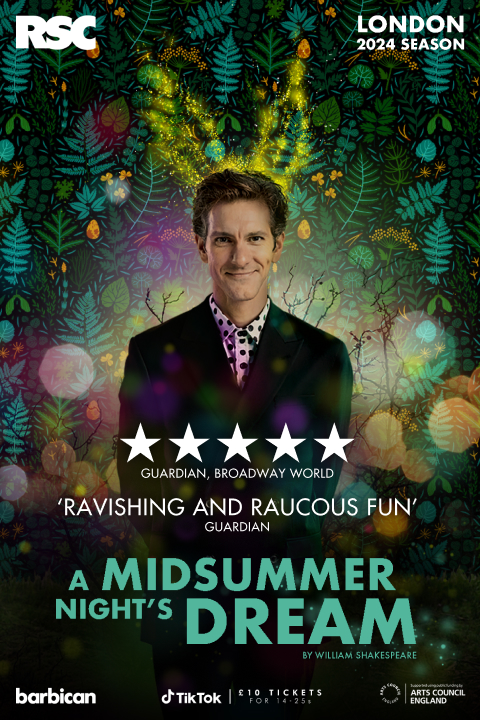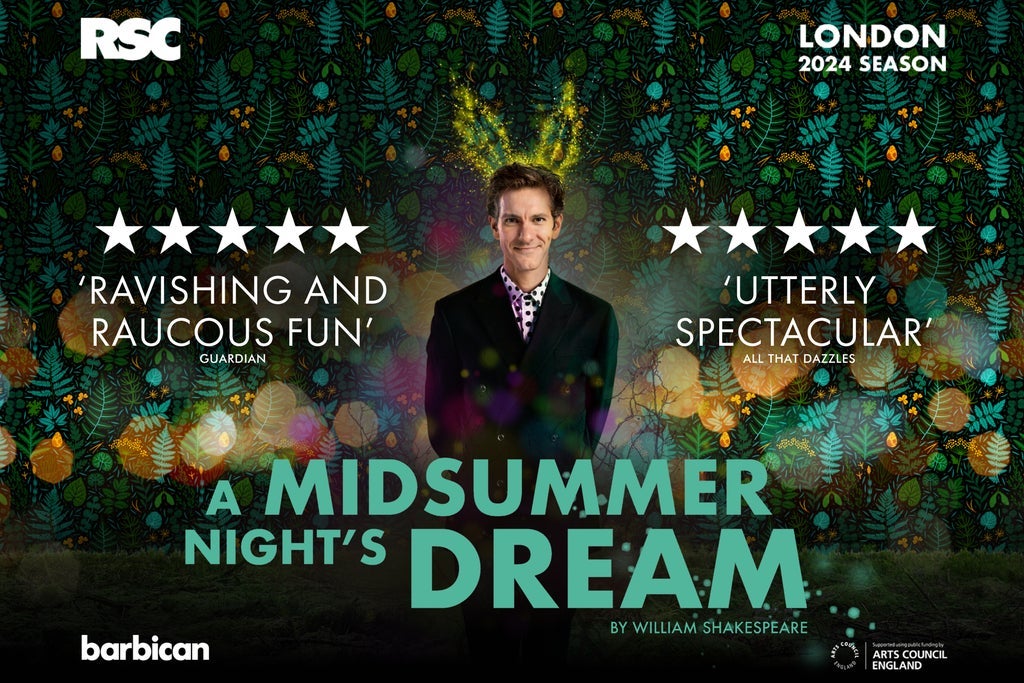Interview: 'Love Makes Every Character a Fool': Andrew Richardson on RSC's A MIDSUMMER NIGHT'S DREAM
'I didn't know who Oberon was when I got sent the audition!'
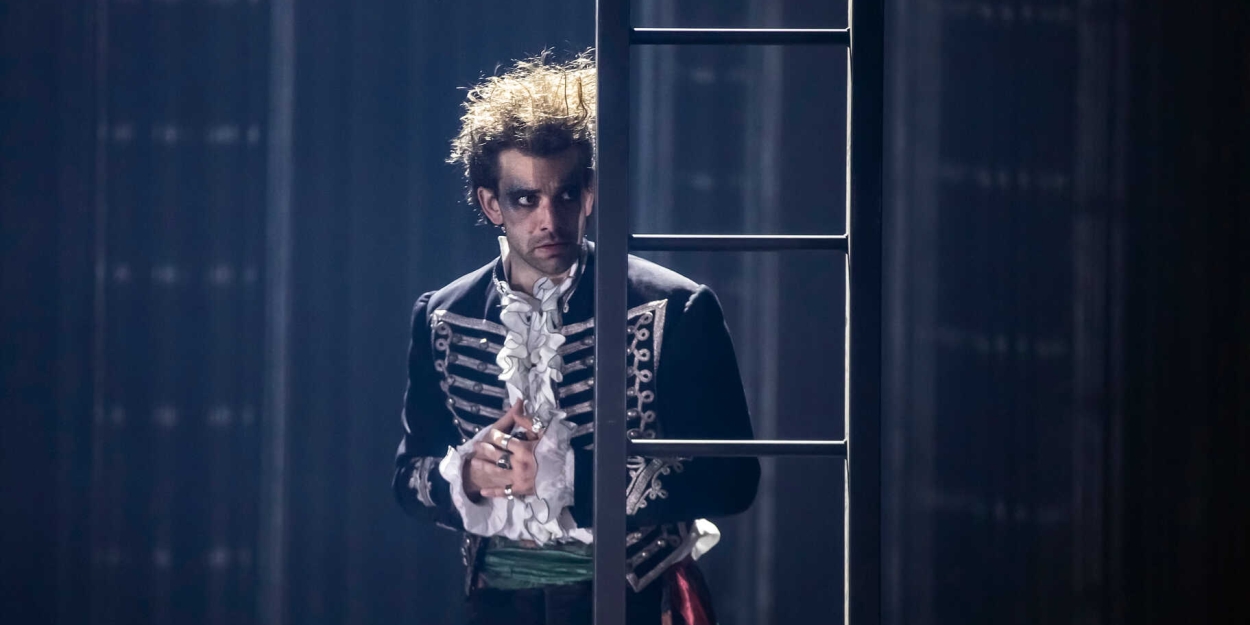
The Royal Shakespeare Company’s production of A Midsummer Night’s Dream has transferred from Stratford-upon-Avon to the Barbican Centre for the winter. Starring Mathew Baynton as Bottom, the Shakespeare comedy tells the tale of four young lovers from Athens who escape into a magical forest where they come face-to-face with the fairy world.
Recently, we had the chance to talk with Andrew Richardson, who plays both Oberon, king of the fairies, and Theseus, the ruler of Athens. We discussed his lifelong dream of being a part of the Royal Shakespeare Company, how Eleanor Rhode’s direction makes this production so unique and the untraditional way he began with immersive theatre.
How did you first get started in the world of theatre?
I did a play called On the Razzle by Tom Stoppard when I was a little kid, and that play went to the Edinburgh Festival Fringe. It was the first play I'd ever done, and going to the Fringe Festival as a young kid was one of the most influential places anyone can experience theatre. You just have so much of it there - some of it's terrible, and some of it's amazing. But as a kid, just on the Mile trying to pass out flyers, and then in the evening, just seeing as much theatre as you can . . . That was what lit the spark.
And what made you want to be a part of this production of A Midsummer Night's Dream? Had you seen the previous version of it in Stratford-upon-Avon?
I had not! When it was going on, I was doing a different play at the time. But the RSC has been the dream since I was a kid. Early on in drama school, I remember watching the John Barton Shakespeare videos and all those interviews of the greats of that generation - Maggie Smith, Patrick Stewart, Ian McKellen, all of them. They were the role models, and they all went through the RSC. In my mind growing up, the RSC was the end goal. So for me, it's been about trying to get the right credits, trying to meet the right people, trying to do whatever one needs to do just to get in the room to audition. It wasn't about selecting A Midsummer Night's Dream - it was just trying my hardest to get into that room. I feel extremely blessed to have finally been able to get in that room, and then for Ellie [Rhode], the director, to take a shot on me. And it's been wonderful since!
And for those unfamiliar with A Midsummer Night’s Dream, can you tell us a bit about the characters you play, Oberon and Theseus?
Yes! Theseus is the Duke, he's mortal, and then Oberon is king of the fairies. It's incredibly fun being able to do two roles, because Ellie really allowed me to find the antithesis between the two. It feels like I'm doing almost two entire plays simultaneously, which is a lot of fun and very challenging! But I'm supported by an extraordinary cast, so all I have to do is show up on stage and listen to their work. My take on them was to look at what the text provided and to see how far we could push the other way.
And again, Ellie, our director, was very encouraging of that. For example, the king of the fairies, he's often portrayed as a king. And I was interested in saying, “Okay, if the text says he's a king, then I don't need to show he's a king. So what can we show? Can we show him being petulant? Can we show him being insecure or powerless?” So we had a lot of fun, both for Theseus and Oberon, through the encouragement of the director, to explore all those things that we don't necessarily get to see in most productions. And I think it's been like that for everyone. She's really encouraged all of the actors to find the other side instead of what we're typically seeing in the plays.
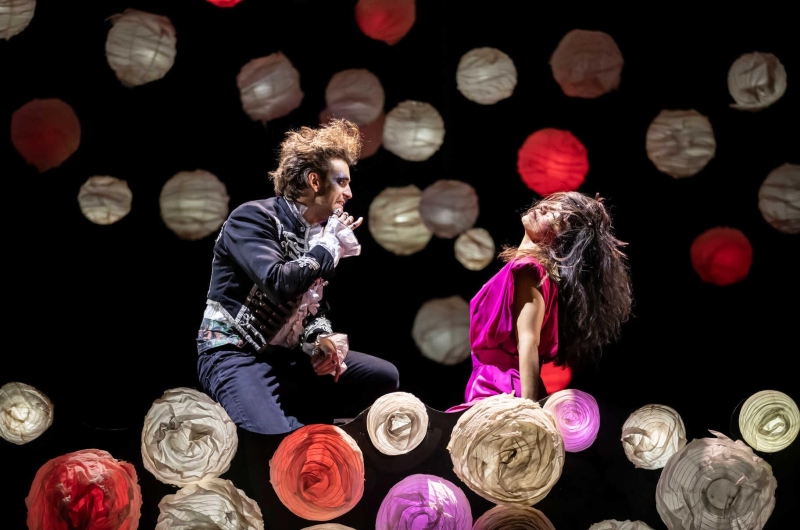
So you'd been familiar with A Midsummer Night's Dream before joining the cast?
I'd never seen a production, I'm embarrassed to say! Because a lot of my schooling was in the US, it wasn't necessarily part of the curriculum as it is for so many people here. I'm amazed how many people in the audience arrive and they've either seen multiple productions or have a very intimate knowledge with the plot and the characters - I didn't know who Oberon was when I got sent the audition! However, I found that incredibly advantageous.
One of the frightening parts about Shakespeare often is when you encounter a famous speech, scene or character, it can be incredibly intimidating, because you're joining a legacy of work and great performers. However, I felt massively freed from that pressure, not having much of a preconception - it was a blank page for me.
What has it been like performing at the Barbican?
It's huge. It's a big theatre! It's my first time doing a show in proscenium. The only other two shows I've done have been Guys & Dolls at The Bridge and then Uncle Vanya with Trevor Nunn at the Orange Tree, which is entirely in-the-round, both of which I loved for that reason. There's nowhere you can stand that isn't right in those spaces, whereas here, there's a lot more stagecraft that needs to be applied. And that's taken me a while to get used to!
It took me a full two weeks from press night to have the confidence to simply look out into the audience, because I don't see the audience - it's just black because the lights are in your eyes. And because I've just not had that experience, I found that incredibly intimidating, to just see black and know that there's well over 1,000 people sitting right there. To be utterly confident, it's taken a long time. But a wonderful experience and a good learning curve.
I feel like it's the opposite of what most actors go through, where they start with the proscenium and then learn the other styles!
I’ve heard that! It's funny, the director was saying most actors feel they're terrified of in-the-round because there's nowhere to hide, but when I'm in the round, I don't feel like I'm being observed. I feel like they're [the audience] a part of the show. There's an unspoken partnership between the audience and the performer, where we're in it together, we're in space together. Whereas the proscenium, it feels very much like the audience is observing the separate world, and that fourth wall is present. I don't know if that's necessarily helpful for Shakespeare or not. It can help or hinder, depending on the character you're playing. For some of the other actors, they really enjoy that break - it helps them. But I find it difficult as Oberon [and] I find it helpful as Theseus, funnily enough!
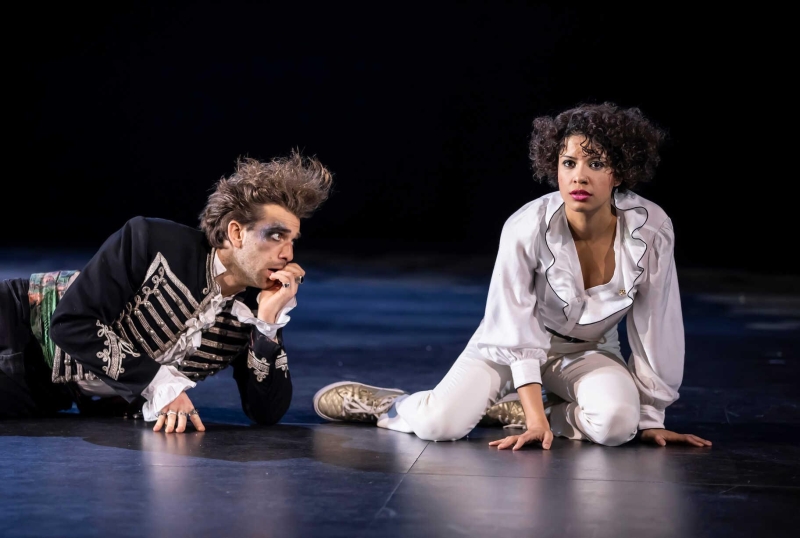
What is it like preparing for a role in a Shakespeare play versus a musical like Guys & Dolls?
The text is the big one! For Guys & Dolls, I needed to learn how to sing first, so there was the practical elements of them needing to fly me over to London and to start training - a bit more of a practical skill to be learned. For this, it's just text work - spending a lot of time with the language, the vocabulary, the sounds of it, the music of it.
It was slightly more difficult for myself and Katherine Pearce, who plays Puck masterfully. We only had three weeks of rehearsals before jumping in, whereas they typically have six or more weeks. So for this process, it was a lot about just living with text. Because I didn't have much time, I ended up going and pasting my script into a little notebook. It was the only way that I could keep the script in my pocket, so that even when I was on the train, I could just start looking through to try and make up for time. So it was far more academic, I suppose.
Do you have any favourite lines or scenes from the play?
My favourite scene to do is my first scene with Puck. In our script - I don't think it's the same in every script - the queen of the fairies [Titania, played by Sirine Saba] has just left, and Oberon is angry and petulant. He says, “My gentle Puck, come hither,” and essentially describes this flower, and then asks Puck to go get the flower. But I've really enjoyed the chemistry that Katherine and I have been able to find as Puck and Oberon, and it's felt very original. It's felt like ours. It feels far more like Tweedledum and Tweedledee than king and servant.
That's something we were eager to find on the offset, and I think we've been able to find that. It's been helped by our friendship off stage, but to bring that on stage is really fun because it allows us to be silly and have fun and make each other laugh in real time. And it allows it to be different every single night! I don't think we've done a single show the same way, simply because we have that chemistry that allows us the freedom to do so.
I've seen a few productions of Midsummer, and this is one of the more unique interpretations of that relationship!
Oberon, as I mentioned before, the script says he's the king of the fairies, but he's just not the smartest. He's very impulsive. If he's feeling angry, then he's angry, and if he's feeling amorous, then he's amorous. Of all people to entrust with his “dark plans,” he chooses Puck! [Laughs] I didn't want him to be conniving or all-knowing or powerful because, in my opinion, he's just not - nothing goes right. And then, because of that, he does seem to have this moment in which he genuinely feels bad afterwards and tries to undo it. Both Katherine and I heavily related to that childishness, both for Puck and Oberon, and that friendship came out of that dynamic.
What do you hope audiences take away from A Midsummer Night’s Dream?
That love makes fools of us all. Whether you're a worker putting on a play like the Mechanicals, whether you're mythical royalty, whether you're actual royalty, whether you're a teenager in love, it just doesn't matter. Love, in some way, makes every single character on this stage into a fool. They're trying so hard not to be, but it inevitably has that effect on everyone. And that's a really lovely aspect - it's essentially saying it makes all of us equal. It highlights the humanity.
And finally, how would you describe A Midsummer Night’s Dream in one word?
Love. It's the only thing that all of them have in common. Or perhaps chaos! A lot of chaos.
A Midsummer Night’s Dream runs until 18 January at the Barbican Theatre
Photo Credits: Pamela Raith


